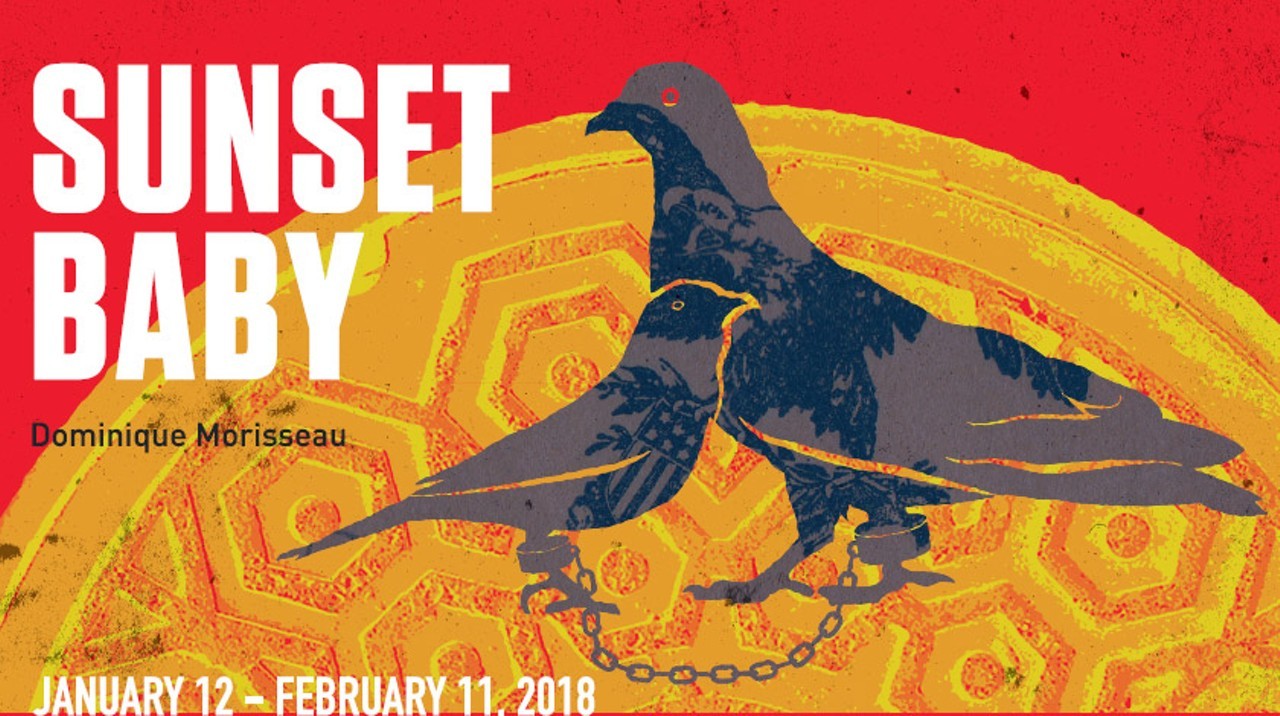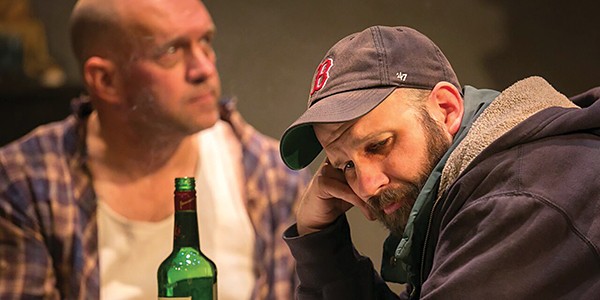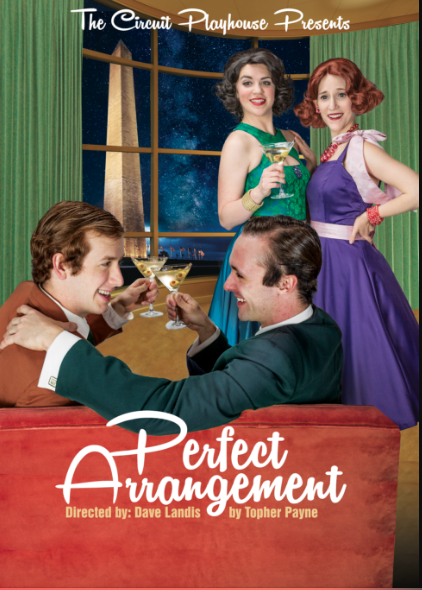
I’ll have fuller reviews of all these plays available shortly. In the meantime I just want to encourage everybody to take advantage of an opportunity to go to the theater on a weekend when you’ll have to try extra hard to see a bad show. The mix of musicals, dramas, classics and world premieres makes for an especially rich spread. So if you’ve got a hole in your schedule this weekend, fill it. If you’ve got plans, cancel at least one. Whether you’re already a theater lover or just a little bit curious any all of these pieces will satisfy.
Once at Playhouse on the Square
Take a peek at this seconds long video. I’ll wait.
You Can’t Go Wrong With ‘Once,’ ‘Fences,’ or ‘Sunset Baby’
That clip’s from the pre-show. You know, the half-hour or so after audience members are allowed into the theater but before the show actually starts. It’s the (mostly) full cast of Once having a fiddle-sawing, guitar-picking, mandolin-strumming, box-beating, foot-stomping, tin whistle-tooting jam session. It’s fantastic and they carry the joyful Celtic momentum into this bittersweet Irish ballad of a musical that invests far more in the power of live music and honest theatrical performance than it does in Broadway spectacle.
Once is the story of a depressed young songwriter who lives with his old Da above the shop where they make Hoovers that don’t suck suck proper again. His girl’s left him for New York, and nobody’s listening to his music except for the struggling Czech immigrant who becomes his muse and chief motivator.
The ensemble’s amazing but the secret star of this Once is simple wooden stage that looks like it was designed not to impress visually but to maximize the warm sounds of acoustic instruments and lightly amplified human voices. It’s a little like hearing guitars played inside a bigger guitar. It’s hard not to get swept up in the songs, and swept away by the story.
Highly recommended.
Sunset Baby at The Hattiloo
You want to see one really great performance? Oh baby. Decked out in fuck me boots and the war paint of a woman who lures Johns into her car in order to rob them Morgan Watson’s Nina is as hard and multifaceted as cut diamonds. It’s hard to eclipse actors as strong as TC Sharp and Emmanuel McKinney, and they both hold their own as Nina’s long absent father and gangsta boyfriend respectively. But whether she’s rolling her eyes and saying, “I love you,” or holding forth on what it really means to be “children of the revolution,” it’s hard to take your eyes off Watson long enough to look at anybody else in a tight, terrific ensemble.
Sunset Baby’s set after the death of a one time Civil Rights icon named Ashanti X who had struggled economically, becoming a less than inspiring crack addict in later years. Now that she’s dead her papers are worth more than she ever was and Nina’s long-estranged father shows up looking to get back into his daughter’s life. And for letters Ashanti X had written to him while he was in prison.
Sunset Baby is a GenX story looking at lives shaped by a stalled Civil Rights movement, when protest gave way to politics, and old heroes became fringe figures and outlaws. It’s a little play telling a big story.
Highly recommended.
All Saints in the Old Colony at TheatreWorks
Here’s an excerpt from my review of a great fookin’ world premiere launched right here in Memphis.
All Saints in the Old Colony feels like Homokay’s New England-flavored answer to Katori Hall’s housing project drama Hurt Village. The Old Colony, Boston’s second oldest housing project, has changed quite a bit in recent years, but was once a dense cluster of brick towers populated by poor Irish families. As with Hurt Village, All Saints is set against a backdrop of gentrification and change. It tells the story of Kier, an Irish-born immigrant and disabled dock worker who, in the absence of parents, raised his siblings as best he could, making hard decisions that still haunt his malnourished, whiskey-soaked brain.
 Carla McDonald
Carla McDonald
All Saints in the Old Colony: real people, real problems
More specifically, it tells the story of an attempted intervention where the whole family comes together — including sister Fiona who was given up for adoption at an early age — to help Kier into a healthier lifestyle. But, in the words of playwright Sam Shepard, whose work is also reflected in All Saints, there’s no hope for the hopeless. Opportunities for temporary escape abound, but for these siblings normalcy will always be relative, and there’s no hope that these four — five, counting an offstage brother too unforgiving to appear — will ever find peace, let alone happiness.
Highly recommended. 
Fences
Theatre Memphis’ second production of Fences is another good opportunity to revisit favorite topics like exceptionalism and how badly our legacy playhouses serve Memphis’ communities of color, and how productions like this first-rate go at an August Wilson classic are the very thing we talk about when we talk about exceptions proving the rule. But I’ve buried the lead, so put those thoughts on hold long enough to consider this: No matter how overexposed Fences may be relative to some of Wilson’s consistently strong oeuvre this perfectly cast and lovingly-staged production is something you’ll want to see. Maybe more than once.
Highly recommended.
You Can’t Go Wrong With ‘Once,’ ‘Fences,’ or ‘Sunset Baby’ (2)
Perfect Arrangement
This is the only one of the bunch I haven’t seen yet, but it sounds awfully intriguing. Here’s how the folks at Circuit Playhouse are describing it.
It’s 1950, and new colors are being added to the Red Scare. Two U.S. State Department employees, Bob and Norma, have been tasked with identifying sexual deviants within their ranks. There’s just one problem: Both Bob and Norma are gay and have married each other’s partners as a carefully constructed cover. Inspired by the true story of the earliest stirrings of the American gay rights movement, madcap classic sitcom-style laughs give way to provocative drama as two “All-American” couples are forced to stare down the closet door.
Verdict: We’ll have to wait and see, but it better be good because the competition is stiff.
